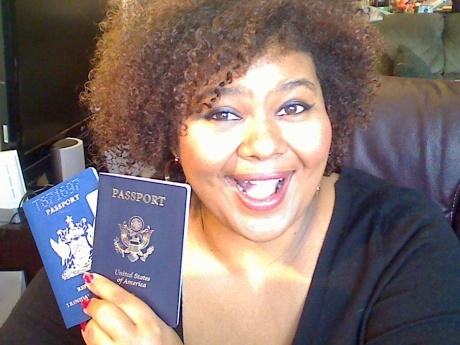
30 Nov It Happened to Me: I Became an American Citizen
This post originally appeared on xojane.com.
When I left my homeland of Trinidad and Tobago for Miami, Florida in 1998 I didn’t think to myself; “Say goodbye to your old life, Patrice. You’ll never live here again.” It wasn’t that serious.
Sure, I’d left my family, friends and native country behind, but I was going to college (Go Canes)! New adventures and opportunities were waiting. New boys to bat my eyelashes at. New girls to share a bathroom with.
By sophomore year, my visits back to Trinidad had become just that. Visits. After just a week and a half back home, I’d begin to daydream about my friends abroad and the new life I’d begun to create for myself. And, OK, fine, my college boyfriend.
Steve is a born and raised, true blue Midwesterner. As American as they come. We first met in the elevator of our dorm — he lived on the 6th floor, I lived on the 7th. We became super good friends freshman year, officially started dating sophomore year, yadda yadda yadda, three weeks after we graduated, we got married.
And that was when immigration officially entered the conversation.
When you get married at age 22, people are happy for you but there’s often an underbelly of assumption and expectation, especially if one of you is a foreigner. Just replace pregnant with immigrant. “Congrats! So now you’ll be a citizen, right?” Actually, that’s not how it works.
Steve and I are coming up on a decade of marriage and I only just became a US citizen this October. Why did it take me the better part of 11 years to get it over with? Because the process is kind of expensive and excruciating. My main stumbling blocks were:
1. The money.
The filing fee for citizenship paperwork is $595, and then there’s an $85 biometric fee. Attach lawyer consultations to that and the paperwork to even get a green card in the first place, it adds up to a tidy sum for a young couple to cough up.
2. It’s super stressful.
Especially if you hate dealing with standardized tests and mind numbing paperwork that requires specific details on half-forgotten trips you took five years ago.
3. It’s a commitment.
You need to study US civics and history and a smattering of geography. Most of the questions are the kind of thing American kids learned in junior high. Stuff like, how many senators are there? How long do members of Congress serve? What is the supreme law of the land? Name three of the 13 original states. That sort of thing. If you’ve never officially had to learn this stuff (but watch the news and the History Channel often enough), you should be alright. But if you’re a worrywart about studying and performing well on tests, see No. 2.
Plus, I’ll admit to having a little apprehension about the process. A nasty incident at the Miami International Airport (and a power-tripping immigration officer) made me very nervous about dealing with paperwork and the USCIS in general.
When you’re not a citizen of this country, entering from overseas can be an exercise in fear, and Miami International Airport is particularly awful in how they can make you feel. Once you’ve been detained in one of those glass rooms for a few hours, you never want to fly out of the country again.
And despite practically losing my island accent, I’m still a Trini. I’m proud of my country and my culture. Would being a citizen of another country in any way diminish that? Part of the Oath of Allegiance every new citizen must take is about RENOUNCING your own country. I felt some kinda way about that.
Continue reading @xojane
Look out for a new issue of Outlish.com every Monday!
Stalk us on Facebook @facebook.com/outlishmagazine
About Patrice Grell Yursik
Twitter •


No Comments